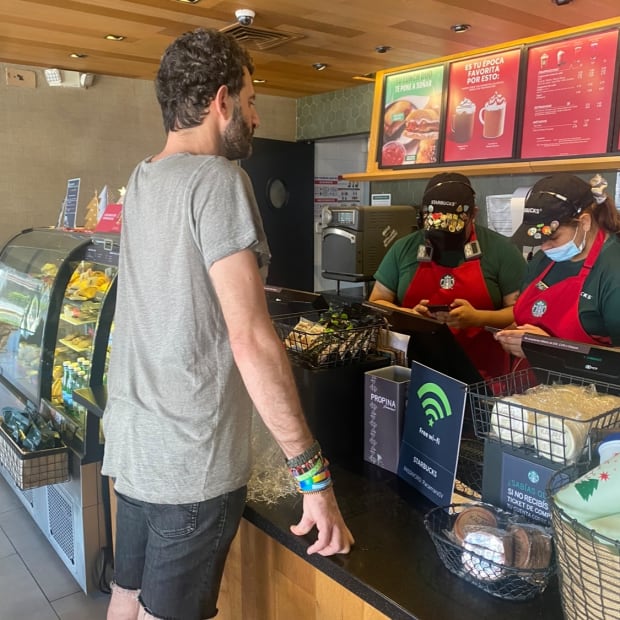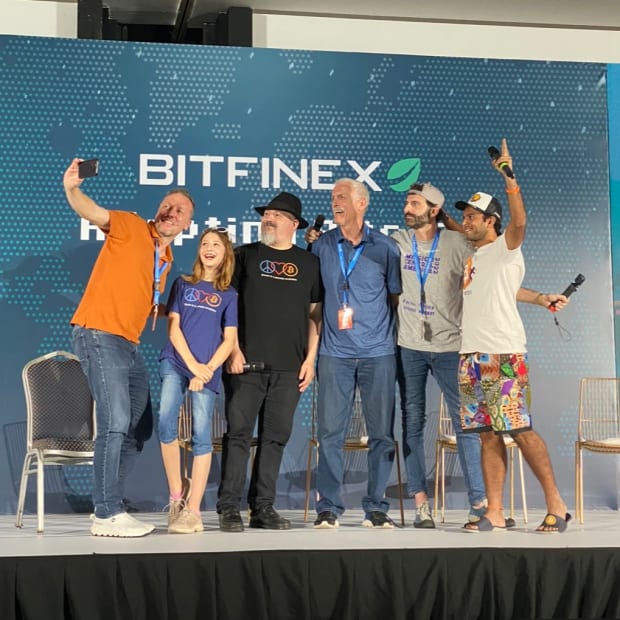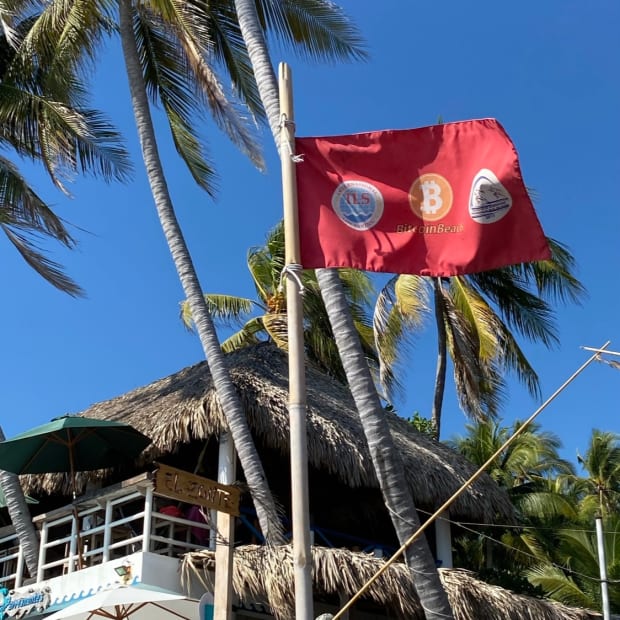Adopting Bitcoin: El Salvador Has Work To Do, But The Experiment Is Worth Celebrating
Visiting El Salvador for the Adopting Bitcoin conference showed that the country’s experiment needs more time, but is worth celebrating.
This is an opinion editorial by Rikki, author and co-host of the “Bitcoin Italia,” and “Stupefatti” podcasts. He is one half of the Bitcoin Explorers, along with Laura, who chronicle Bitcoin adoption around the world, one country at a time.
On the road again. Direction: San Salvador. The Bitcoin community is about to gather here for Adopting Bitcoin, the final major Bitcoin conference of the year, but certainly not the least. Friends and Bitcoiners from around the world are flying into the country to work together and promote Bitcoin adoption. Who knows how many of them knew much about this country before the “Ley Bitcoin” was implemented?
Before returning to San Salvador, we made a pit stop in the village of Ataco — we were invited to participate in the handing out of a Bitcoin diploma, an actual qualification in Bitcoin and financial education that students in (currently) seven public schools in El Salvador receive after participating in a course offered by My First Bitcoin.
Less than a year ago, during our first trip to El Salvador living in Bitcoin only, we attended a meeting between the first principal to join the Bitcoin diploma project, government representatives and the project’s founders. It was a historic moment.
So, for us to see our first Bitcoin graduates in person was a special treat. It was a circle that closed. It is with mass education that our technological and nonviolent revolution will succeed. Certainly, not through the decree of law alone.

Visiting San Salvador
The next day, our awakening in San Salvador was quite traumatic — late, rushed, with the weekly vlog on our YouTube channel to edit and several pressing appointments to make. Because of this, we decided to do something we had not yet done here in El Salvador and we went to Starbucks. Last year, we saw dozens of videos on Twitter of bitcoin transactions at this chain in the country and felt confident this coffee shop would our sats.
“Two cappuccinos and two chocolate muffins please,” we said. “We will pay in bitcoin!”
Silence. The waitress’ lost look meant only one thing: she had never used Bitcoin before and had no idea how to do accept our proposed payment. Her colleague came to her aid but she could not remember the password to their Chivo wallet. No dice. So, we went to the McDonald’s next door, with the same intent.
That is where the real surprise took place: Not even the McDonald’s manager remembered the password for the Chivo app. Less than a year ago, the same establishment was studded with illuminated “pay for your burger in bitcoin!’ signs. Unbelievable.
We remembered that the restaurant’s automated checkouts could create a bitcoin QR code without requiring any password and we asked the staff to try it. It worked! But what a struggle.
Education is everything.
The day before, we witnessed the final test of 16- and 17-year-olds who proved perfectly capable of creating and managing new, non-custodial bitcoin wallets, importing them into new devices, making on-chain transactions and monitoring them in a Bitcoin explorer. Less than 24 hours later, we found ourselves drinking watered-down coffee at a venue whose staff could not remember an application PIN.

Adopting Bitcoin
The conference was beautiful and very well organized. It is good to see so many friendly faces again, from all over the world. The content was of a high standard and audience participation was good.
The panel I participated in was titled “Orange Pilling The World’s Masses” — as if that were easy. I spent the night taking notes:
- I don’t like the term “orange pilling,” though I wish that teaching Bitcoin was as easy as swallowing a pill: You swallow it and boom, you’re a Bitcoiner. I consider it a misleading term. Studying and understanding Bitcoin is a long, time-consuming process.
- Bitcoin is the greatest human rights tool ever invented. It was so long before “have fun staying poor,” and its price does not even matter to me. Price is just a consequence of its technology and the social revolution it is bringing. In El Salvador, where a person understands that bitcoin is also fundamental to their own survival, they understand everything. That, for me, is the “orange pilling” moment.
- What wallet do I recommend downloading for orange pilling? It depends on who I’m talking to. If it’s someone completely new to the field, I go with Wallet Of Satoshi. The Lightning transactions there are amazing. True, it is completely custodial (not your keys, not your coin!), but the user experience is amazing. There are just two buttons and it’s instant. It works like a charm. But if I talk to someone who already knows something about the technology, I go with Blue Wallet. In this application, you have two different wallets: the non-custodial bitcoin wallet (of which you then own the private key) and one for using the Lightning Network. I think it’s very useful to make the difference between Layer 1 and Layer 2 clear. If you want to pay for a coffee with the Lightning Network, you literally have to move your bitcoin from Layer 1 to Layer 2.
- In our work, we always have to keep in mind that it is really very early. As Bitcoiners, we would like to see this technology applied to the world as soon as possible. The truth is that history itself teaches us that this will not be possible. Think of credit cards: Frank McNamara invented the Diners Club, the world’s first credit card, in 1950. It took a notable amount of time after this for credit cards to become truly relevant. Bitcoin, in addition to being a disruptive technology, is a philosophical achievement. That’s why so many pre-coiners don’t think they need it and that it doesn’t solve any problems for them. We have to be patient and allow this creature more time to develop.
- When will we reach hyperbitcoinization? I always wonder what is meant by this word. The diffusion of a technology to transmit value instantaneously and without boundaries? To me that is not hyperbitcoinization. Bitcoin will allow us to vote in a distributed network, to certify in a distributed network. It will enable us sooner or later to disintermediate any trust process. Trust is obsolete.
The notes worked and the panel went very well. There were roars of applause and lots of compliments.

Sunbathing In Bitcoin Beach
The third day of the conference was a chance to socialize as we sunbathed at Bitcoin Beach in El Zonte.
We are so immersed in Bitcoin that sometimes we forget to be analytical and really rationalize what is happening to us and to the world around us.
Let’s think about it: We were in Central America, the soundtrack of this day was the sound of the Pacific Ocean crashing on the black sand and volcanic rocks of the coastline. All around us were tropical vegetation, incredible sunsets and exotic animals. People from dozens of different countries have gathered here. To sharpen your hearing was to perceive a Babel of different languages and accents. All of this happened solely because of the intuition of a pseudonymous scientist — someone who dared to dream so big as to come up with something capable of changing the world.
If this thing, in itself, is not incredible, I really don’t know what is.
The truth is that Bitcoin has already changed our lives, irreversibly. And it has also already done so for so many people who are able to take this idea and embed it into their jobs or even to invent a new job from scratch. There are many such examples here. Sure, lots of technical people, like developers, journalists and entrepreneurs. But also many more creative people. The young man from India who decides to travel the world in Bitcoin, 40 countries in 400 days. The American couple who manages to teach while having fun. The journalist who, once he falls down the rabbit hole, devotes himself exclusively to Bitcoin. The driver who, thanks to Bitcoiners, sees his business scale like he never could have imagined. The small coffee producer who manages to export by getting paid in an instant and without onerous fees.
We could go on listing similar cases for hours. These are small things, let’s be clear. And perhaps they are isolated examples. And it may take resourcefulness and a touch of madness to make your dreams into realities with Bitcoin. But it is already possible. Bitcoin works. It changes the lives of those who can seize opportunities and all that it takes is having that spark.
The nights in El Zonte were hot and humid at this time. The sun set quickly behind the horizon. We all met at a hotel called Palo Verde for a conference party organized by IBEX. All of our friends were there, those we love. We had something to eat, chatted for a while, and then the music started. There is nothing more liberating than dancing on the beach, feet in the sand. It was super hot, but the dance floor was still crowded.
At the entrance we were given tickets for a raffle and prizes were to be drawn. Someone in our group won a very good bottle of whiskey. That’s the end. As the amber liquid trickled down our throats, we already anticipated the hangover headache. When the music ended, it was time for goodbyes.
The road home for us translates into a long walk on the shoreline, under an impressive starry sky, barefoot, with the waves placidly bathing our ankles.
Pura vida.

This is a guest post by Rikki. Opinions expressed are entirely their own and do not necessarily reflect those of BTC Inc or Bitcoin Magazine.









